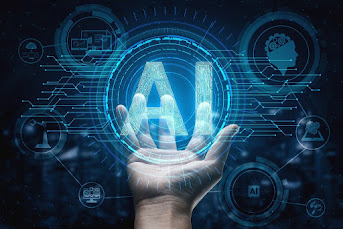Artificial intelligence and impact on society
1:Positive Impacts of AI
.Increased efficiency and productivity
.Improved healthcare and medical advancements
.Enhanced safety and security
.Advanced transportation systems
2:Negative Impacts of AI
.Job loss and economic disruption
.Privacy and security concerns
.Bias and discrimination in AI systems
.The potential for AI to be used for malicious purposes
3:The Future of AI and Society
.The continued growth and development of AI
.The importance of ethical considerations and regulations
.The potential for AI to create positive and equitable outcomes for society
4:Conclusion
.The complex and multifaceted impact of AI on society
.The need for responsible development and implementation of AI technology
.The potential for AI to create positive change and improve the human experience
Definition of Artificial Intelligence:
Artificial Intelligence, commonly referred to as AI, refers to the development of computer systems that can perform tasks that typically require human intelligence, such as visual perception, speech recognition, decision-making, and language translation. The field of AI has been developing for decades, with early work dating back to the 1950s. However, recent advances in computing power and data analysis have dramatically increased the capabilities of AI systems and the potential impact they could have on society.
1.Positive Impacts of AI
One of the primary benefits of AI is its ability to increase efficiency and productivity. AI systems can automate many tasks that are currently performed by humans, freeing up time and resources for more complex and creative endeavors. In industries such as manufacturing and finance, AI systems are already being used to improve efficiency and streamline processes.
Another area where AI is having a positive impact is healthcare. AI algorithms can be trained to analyze medical images and diagnose diseases, making it possible to detect illnesses earlier and more accurately. In addition, AI is being used to develop new treatments and medications, and to analyze vast amounts of medical data to identify patterns and develop new insights into diseases.
AI is also helping to improve safety and security, particularly in areas such as crime prevention and transportation. AI systems are being used to analyze surveillance footage, detect and predict criminal activity, and improve traffic flow in cities. Self-driving cars, which use AI systems to make decisions and control movement, have the potential to dramatically improve road safety and reduce the number of car accidents.
2.Negative Impacts of AI
While AI has the potential to bring many benefits to society, there are also concerns about the potential negative impacts. One of the most significant concerns is job loss, as AI systems become increasingly capable of performing tasks that were previously done by humans. The displacement of workers by AI systems could lead to significant economic disruption and inequality, particularly in industries where low-skilled jobs are most vulnerable to automation.
Another concern is the privacy and security of AI systems. As AI systems become more integrated into our lives, it is important to ensure that our personal data is protected and that AI systems are not used for malicious purposes. There are also concerns about the potential for AI systems to perpetuate existing biases and discrimination, particularly in areas such as hiring and criminal justice.
3.The Future of AI and Society
The continued growth and development of AI is inevitable, and it will likely have a profound impact on society in the coming years and decades. It is important to consider the ethical implications of AI technology and to develop regulations that promote responsible and equitable use. This includes ensuring that AI systems are transparent and accountable, and that their decisions and actions can be audited and challenged.
4.Conclusion:
Artificial Intelligence is a rapidly developing field that holds great potential to improve our lives and solve complex problems. However, the impact of AI on society is complex and multifaceted, and it is important to consider both the positive and negative impacts of this technology. The continued growth and development of AI is inevitable, and it will likely have a profound impact on society in the coming years and decades.
It is crucial that we approach the development and implementation of AI with caution and responsibility. This means considering the ethical implications of AI technology and developing regulations that promote responsible and equitable use. This includes ensuring that AI systems are transparent, accountable, and auditable, and that they do not perpetuate existing biases and discrimination.
Ultimately, the future of AI and its impact on society will depend on how we choose to use this technology. If we approach AI with caution and responsibility, it has the potential to create positive and equitable outcomes for society and improve the human experience. However, if we do not take these considerations seriously, the negative impacts of AI could outweigh the positive, leading to a future that is less safe, less equitable, and less human.






Comments
Post a Comment